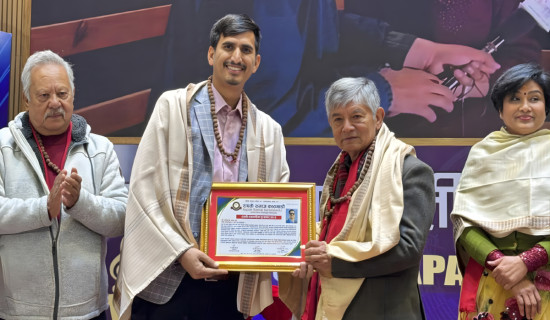- Monday, 29 December 2025
Gyanu Adhikari's Meditative Essays
Essayist and critic Gyanu Adhikari's collection of essays, 'Samvedanako Samayaog,' is a captivating reading where we can find different sorts of essays—narrative, descriptive, and meditative. Simple but compelling essays compiled in the book touch the heart of every Nepali reader who somehow goes through similar experiences in their childhoods, academic careers, and unlocking of potential as witnessed by the author.
Reminiscence is both the dominant technique and theme in the book. The celebration of childhood in Adhikari's essays takes us to our own past that was full of joy, innocence, bliss, and sometimes plight as well. Irrespective of the struggles we face in childhood and the young days, they are so unforgettable that we cannot get rid of the memory. One of the descriptive essays, 'A Story Written with Tears and Sweat,' shows the plight and scourge the writer and her mother underwent, reminding us of a horrible past, but she vividly narrates the event: how struggling it was to witness her mother's stress for paddy cultivation, which, however, turned into a fiasco that they could not harvest. The description of the atmosphere and environment—both the human psyche and the outside world—during the plantation is rustic, where soil and mud are essential parts of one's daily life. And the mud is often linked to fruit and fruition.
Similarly, feminist views are essentially intriguing. 'Woman in Journey of Human Civilization' is an essay that throws light on gender comparison and contrast. The misbehavior, discrimination, divide, and contradiction surrounding men and women are meticulously explained with critical analyses in the essay. She wonders how contradictory it is that women are given the place of Goddess (sanctity) on the one hand while belittled and debased in the same society. The potency of women in the form of various goddesses and regarding women as the fair and weak sex are equally contradictory. The idolized life of women faces tragedy when they are enslaved with the ill social practice of early marriage, child marriage, chhaupadi, and forced marriage in Nepali society, she argues.
Adhikari has brought forth the views of Simone de Beauvoir and Mahadevi Verma as references to substantiate her arguments. She calls on women folks to restore their identity of courage, judiciousness, and intellect that prevailed in ancient times. Similarly, the male ones are asked to change their behaviors to build an equitable and equal society where there is a complete absence of oppression and suppression of women.
The writer vents her ire against limiting women to routine jobs and chores. Even the works are dubbed feminine, and the customs ridden on women, which, she says, have rendered women inferior in society. In the essay, 'Decoration, Beauty and Woman,' Adhikari writes, "The bliss achieved after struggle, happiness ensured with success, an image built with self-esteem, and a prideful moment with honor are not realised by the women. What they know and realize is the short-lived material happiness." Why are women destined for it? She ponders and warrants readers' rumination.
The essayist also compares her village in Chitwan with Kathmandu city. She finds Kathmandu a deserted land and Kirtipur a diaspora. Love, beauty, gender, sensitivity, and aesthetics are other issues dealt with finely in the essays. The moments of happiness, anger, frustration, felicity, and bliss are meticulously described in her essays that forcefully engage us in nostalgia, rumination for reform, regret over the past, and commitment to betterment.
The challenges she has described in relation to the writing careers of women may, however, go beyond the gender lens. Even a middle-class male writer may face problems and obstruction to some extent, as Adhikari has explained in her essay, 'Challenges of Women in Writing.' "From morning to evening, there is the same routine. To read the newspapers comfortably, it is essential to wait till night. What's the enthusiasm of reading the write-ups that have already been read and made viral with comments?" (Pg 33). She wonders. Undoubtedly, Nepal is a gendered society—patriarchy rules the roost. There is no denying that household and social responsibilities have burdened Nepali women in a way that only a few can rise and raise questions before the unjust society and system.
It is true that the Nepali people and society still do not regard reading and writing as a job or profession. "The Nepali family and society do not count reading and writing as a profession," she laments. It is not only a writer's wonder but also a scathing reality of how academic works—reading and writing—are disparaged. It is also because of such a society that academic people are not accorded respect. The writer further claims that traditional thoughts developed as culture are so entrenched that they are the most powerful chains to tame people, especially women.
The dilemma of women writers is also elucidated in her book—whether to continue patriarchal adherence or to wage revolt while there are shackles abound. She makes a strong assertion that women are not characters to be sympathized with but competent beings to take up responsibilities and wake up society.
Regarding the campaigns waged for people's rights, she reminds: "What were the wars, revolutions, struggles, and movements for? Weren't they for equality, freedom, and rights? Then, as women raise their voices for their rights at present, why is it termed unnecessary?" These questions are made to the male ones who belittle and disregard women folks and their voices for justice. She goes further: "Is feminism a crime?"
The essays of different kinds incorporated in the collection are short and easily understandable. In addition to her personal life, learning, achievements, and struggles, the essays fully represent the current issues that need adequate attention and debates for building a just and equitable society.
Undoubtedly, the book is rich enough to contribute to Nepali literature—essays and critiques. The book is published by Shikha Books. It costs Rs 450.
(The author is a sub-editor at the National News Agency.)

















